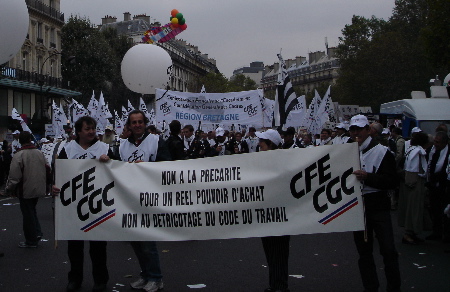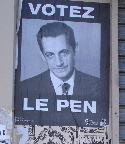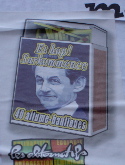09/02/06
“The martyrs of Charonne”
Yesterday, I had planned an academic expedition to L’École des Hautes Études en Sciences Sociales again, this time for a lecture on the sociological use of documentaries where they would also screen a “cinema verité” film on young Parisians’ vision on happiness from 1960 (Chronique d’un été). But chances wanted that I should stay in the neighbourhood and, in fact, be witnessing the making of a documentary on recent French history.
31/01/06
A day in commemoration of slavery
The 10th of May is from now on going to be the national day in commemoration of abolition of slavery. 10th of May in 2001 was the day slavery was declared crime against humanity in France, which was the first country in the world to adopt such a law. It was the deputy from French Guiana, Christiane Taubira, who proposed the law, and its been named Loi Taubira after her.
In his speech, President Chirac proclaimed that “the greatness of a country is to take on all its history, the glorious pages as well as the dark parts. Our history is that of a great nation. Look at her with pride. And look at her as she is. That’s the way a people can unite and become more close(-knit).”
(As a foreigner, I do find interesting this constant return to the greatness of the French nation, and I can’t forget another of Chirac’s speeches lately on the issue of nuclear weapons, but be that as it may).
Le Monde greets Chirac’s speech and holds it together with two other speeches as strong and important moments of his reign as President: 16th July 1995 when he for the first time recognised the French state’s role in the deportation of thousands of Jews during the Second World War; 15th August 2004 when he honoured the North African and African veterans’ contribution to the liberation of France and the speech 30 January 2006.
(Again, many others in this country will not remember Chirac for these three speech, but rather for the one 19 June 1991, gone into history as “le bruit et l’odeur” (the noise and the smell), where the President lately so famous for his antiracist stance made speech worthy of Le Pen. I’d really like to say a lot about it, but be that as well as it may for the moment).
30/01/06
Literature and I, hors sujet 1
- For those who are more interested in my research project than in my person, I hope you’ll excuse this post as it’s got very little to do with my fieldwork. It’s a too long (an delayed, as I’d forgotten to post it…) reply to a post on the anthropology blog Savage Minds.
29/01/06
The city (long) before lunchtime
A friend of mine said that he’d like to leave a comment on my blog suggesting that my fieldwork could have benefited by some knowledge of what happens in the city before lunchtime. As I have in fact been out there many times before 12 o’clock, I have informed him that such a comment is totally ill-informed. Today I’ll even prove that I was out before dawn on a Saturday. (Since it’s in the middle of winter – and winter indeed, since emergency measures are put into action with Plan Grand Froid niveau 2 and alerte orange (in this country not concerning terror dangers, but exceptional snowfall) in half of France – dawn comes not too early).
17/01/06
My blog, my project and I, part 1
The name of my blog is a sort of homage to the field diary that inspired me to start blogging: Jon Henrik among the Ifugaos. Lorenz, my Webmaster and the editor of www.antropologi.info, asked me ages ago to write a few words on why I decided to write a blog from my fieldwork. In fact, the answer isn’t as well-considered as Lorenz, a dedicated net publicist, might have thought. I just thought that what Jon Henrik had done was such a cool thing to do: It was nice to see what he was doing among the Ifuagos. However, after I started I have noticed that blogging sharpens the attention, just like taking a lot of photos (and probably painting) does; One starts to see motifs everywhere, and then one has to reflect on how to make the motif into a story so other people can understand what you want to tell them.
16/01/06
Security à la français: précarité and insécurité

From a large demonstration 04/10/05: “against uncertainty, for a real increase in buying power and against dismantling of the labour regulations”.
Last week I was back home for a few days, and I went to a seminar on the wide-ranging notion of safety/security (“trygghet”). As it happens, two aspects of “security” play important roles in French politics and society; however, these aspects do not seem to be very high on a security agenda in a Norwegian context. I think this difference in emphasis points to interesting economical and social differences between the two societies.
13/01/06
A forgotten link

In my previous entry I had forgotten to paste in a link, which would have given more sense to the claim that choosing between Le Pen and Sarkozy isn’t much of a choice to some radical commentators. This omission gives me the possibility to return for a second to the poster put up around Paris just before Christmas, which didn’t make the ruling party very happy: Votez Le Pen.

The first time I saw the poster on the wall, someone – in typical French public, democratic tradition – had embellished Sarkozy’s face with the facial characteristics of Dracula. (The streets of Paris are full of such popular voicing of opinion, on posters or as comments written on the wall or on other signs or posters). Quite understandably, the poster has created a number of discussions on the Internet, as well (see further down).
Picture to the right: A sticker on the wall with a drawing of a matchbox with Sarkozy's face and the text: 40 banlieue matches.
A non-exhaustive list of sites on the Internet discussing the controversy:
- An article on the matter in The Guardian (in English!)
- Articles (in French) from the political group (Act up, for HIV positives, who made the poster in order to protest against the immigration policy of Sarkozy: The press release “A poster to denounce a racist discourse and a fatal policy” and an article on all the controversy it stirred.
- Le Monde's article (in French) "Act up withdraws the poster from their site"
- An interview with Sakrozy in Liberation (in French) "I know better than Thuram what's happening in the banlieues" and the reply from Act Up the day after: "Sarkozy caricatures himself".
- A number of discussions in Internet chat rooms and blogs: France TV 5, samizdat.net, les indigenes de la republique,
Indymedia, rebellyon.info, grioo.com, and so on...
06/01/06
"It's better to vote than to burn cars"
Two days ago President Jacques Chirac proclaimed the end of the state of emergency which has been in place in France for almost two months. At the same press conference, the president also announced that the law paragraph obliging teachers to “teach the positive effects of colonialism on the former French overseas territories” should be rewritten. The paragraph was implemented in February last year and has made it to the headlines once in a while since then. However, it wasn’t until after the November revolts that mainstream politicians, really started giving much attention to the controversial issue.

